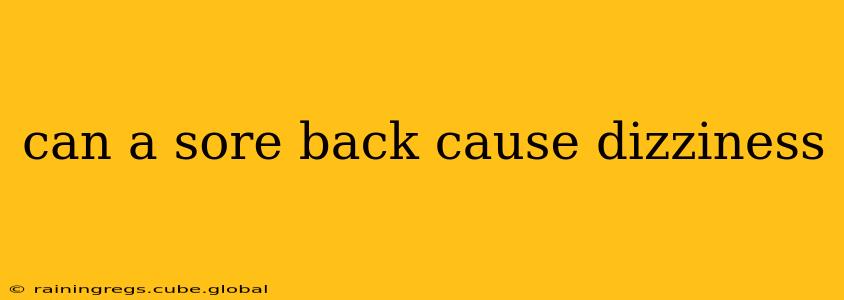A sore back and dizziness might seem like unrelated symptoms, but in reality, there's a complex interplay between your musculoskeletal system and your vestibular system (responsible for balance). While a sore back doesn't directly cause dizziness, certain conditions affecting your back can trigger dizziness indirectly. This article explores the possible connections and when you should seek medical attention.
What Causes Dizziness?
Before diving into the back-dizziness connection, let's understand the underlying causes of dizziness. Dizziness encompasses a broad range of sensations, including lightheadedness, vertigo (a spinning sensation), and imbalance. Many factors contribute to dizziness, including:
- Inner ear problems: The most common cause, including vestibular neuritis (inflammation of the vestibular nerve), Meniere's disease, and benign paroxysmal positional vertigo (BPPV).
- Neurological conditions: Multiple sclerosis (MS), stroke, migraines, and other neurological disorders can affect balance and cause dizziness.
- Cardiovascular issues: Low blood pressure (hypotension), heart arrhythmias, and other heart conditions can lead to dizziness.
- Medications: Certain medications have dizziness as a side effect.
- Dehydration: Lack of fluids can affect blood pressure, leading to dizziness.
- Anxiety and panic disorders: These conditions can trigger lightheadedness and dizziness.
Can Back Problems Lead to Dizziness? The Indirect Link
While back pain itself doesn't directly cause dizziness, several back-related conditions can indirectly trigger dizziness through their impact on the nervous system or blood circulation:
-
Cervicogenic Dizziness: This is a crucial connection. The cervical spine (your neck) houses nerves that directly affect the vestibular system. Problems in the neck, such as whiplash, spinal stenosis, or arthritis, can irritate these nerves, leading to dizziness, vertigo, and imbalance. This is a frequently overlooked cause of dizziness. The pain might be focused on the neck and shoulders, but symptoms manifest as dizziness.
-
Spinal Stenosis and Compression: Narrowing of the spinal canal can compress nerves, impacting signals to various parts of the body, potentially disrupting balance mechanisms and causing dizziness. This is more likely if the stenosis is in the cervical spine (neck).
-
Poor Posture: Chronic poor posture can lead to muscle strain, stiffness, and nerve irritation in the neck and upper back, indirectly contributing to dizziness in some cases.
-
Rare Causes: In extremely rare instances, tumors or other severe spinal conditions may affect the nervous system and induce dizziness.
How Can I Tell If My Back Pain is Related to My Dizziness?
Connecting back pain and dizziness isn't always straightforward. It's crucial to consult a healthcare professional for a proper diagnosis. They will consider your medical history, perform a physical examination, and potentially order imaging tests (X-rays, MRI) to pinpoint the cause of both your back pain and dizziness.
Symptoms to Note: If your dizziness is accompanied by any of the following, it's even more critical to seek immediate medical attention:
- Sudden onset of severe dizziness
- Loss of consciousness
- Numbness or tingling in your limbs
- Double vision
- Severe headache
- Difficulty speaking or swallowing
What are the Treatment Options?
Treatment for dizziness associated with back problems depends on the underlying cause. Options may include:
- Physical therapy: To improve posture, strengthen core muscles, and alleviate back pain.
- Medication: Pain relievers, muscle relaxants, or anti-inflammatory drugs might be prescribed.
- Manipulative therapy: Chiropractic care or osteopathic manipulation may be beneficial in some cases.
- Surgery: In rare instances, surgery might be necessary to address severe spinal stenosis or other structural issues.
When Should I See a Doctor?
It's essential to seek medical attention if your dizziness is severe, persistent, or accompanied by other concerning symptoms like those listed above. Don't hesitate to consult your doctor or a healthcare professional if you are experiencing dizziness and back pain. They can accurately determine the cause and develop a tailored treatment plan.
Disclaimer: This information is for educational purposes only and does not constitute medical advice. Always consult a healthcare professional for any health concerns or before making any decisions related to your health or treatment.
